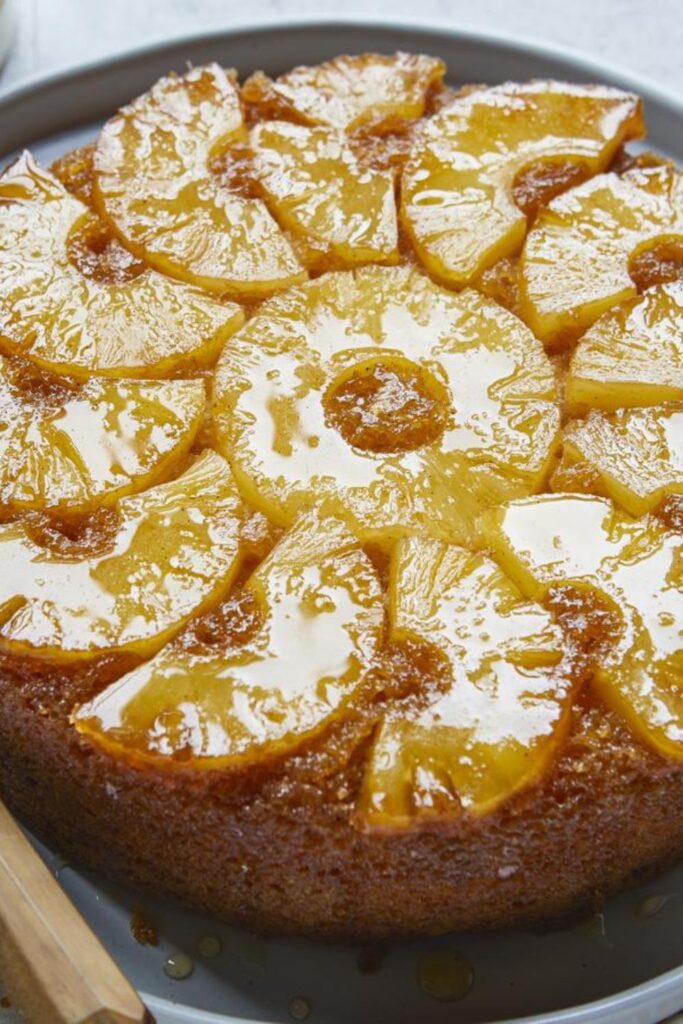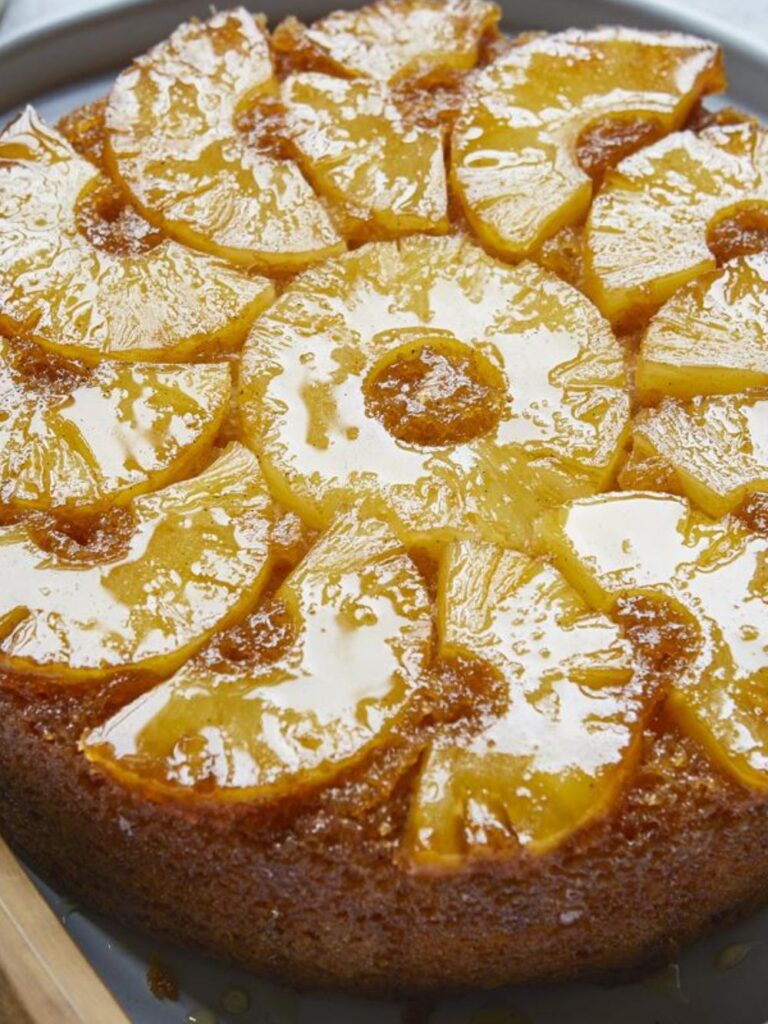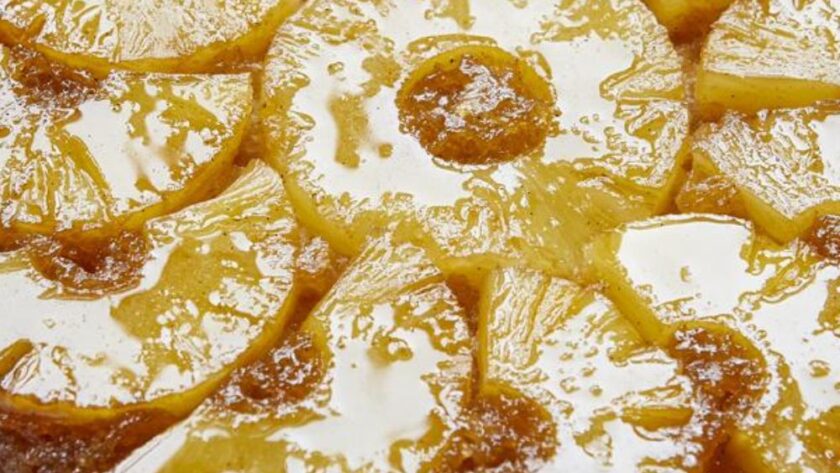There’s something about a pineapple upside-down cake that just feels cheerful before you even eat it.
Mary Berry’s version keeps it simple — buttery sponge, juicy pineapple, and that caramelized syrup soaking into everything underneath.
Honestly, it’s the kind of cake that doesn’t ask much from you but gives back plenty.
Why This Works So Well
It starts with brown sugar and butter melting together. That mixture sinks into the fruit and edges of the cake while it bakes, giving you that sticky, golden layer on top once it’s flipped.
The sponge batter is light enough to rise around the fruit without getting soggy, but sturdy enough not to crumble when you slice through it.
Adding a splash of milk helps soften everything just slightly without making it heavy.
No fancy tricks here. Just good ingredients doing their thing, quietly but perfectly.
Ingredients (And Why They Matter)
- Canned Pineapple Rings: Easy and reliable. Fresh pineapple would probably leak too much and ruin the balance.
- Light Brown Sugar: It gives that deep, soft caramel flavor. White sugar can’t do the same job.
- Unsalted Butter: Keeps the flavor clean and rich without any surprise saltiness.
- Caster Sugar: Finer than regular granulated, so it creams into the butter better, making the cake fluffier.
- Self-Raising Flour: Saves you the trouble of adding extra raising agents.
- Baking Powder: A little extra lift — ensures the sponge rises around the fruit without sinking.
- Vanilla Extract: Warms and rounds out the flavors.
- Milk: Softens the crumb just enough to stay tender.
- Pinch of Salt: Brightens everything — you miss it if it’s not there.
How to Make It
1. Prep Your Oven and Tin
Heat the oven to 180°C (170°C fan) or Gas Mark 4. Grease a deep 20cm cake tin generously.
Pro Tip: Line the base with parchment if you’re worried about sticking — it makes flipping the cake much easier later.
2. Build the Syrupy Base
Melt 60g of butter with 4 tablespoons of brown sugar over low heat. Stir gently — don’t let it boil.
Pour this syrup into the bottom of your cake tin, tilting it around to coat evenly.
Dry the pineapple rings carefully, then arrange them with one whole ring in the middle and halves fanned around it.
Pro Tip: The drier the pineapple, the better the caramel clings and shines.
3. Make the Batter
Beat 175g butter and 175g caster sugar together until fluffy and light in color.
Add the beaten eggs a little at a time, beating after each addition. Stir through ½ teaspoon of vanilla extract.
Sift in 175g self-raising flour, 1 teaspoon baking powder, and a pinch of salt.
Fold gently, adding 2 tablespoons of milk to loosen it just enough to drop off a spoon easily.
Pro Tip: Gentle folding means a lighter, airier sponge. No aggressive mixing here.
4. Assemble and Bake
Spoon the batter gently over the pineapples, smoothing it carefully to the edges.
Bake for about 30–35 minutes, checking with a skewer around 30 minutes. It should come out clean or with just a crumb or two.
Pro Tip: If it’s browning too quickly, just lay a loose piece of foil on top to slow it down.
5. Flip It Over
Let the cake sit for about two minutes after coming out of the oven.
Then, place a serving plate over the tin, grip tightly, and flip in one steady move.
Peel away the tin and marvel at that sticky, golden top.

Common Mistakes and How to Fix Them
| What Went Wrong | Why It Happens | How to Fix It |
|---|---|---|
| Wet, heavy sponge | Pineapple was too juicy | Drain and dry pineapple thoroughly |
| Cake stuck inside the tin | Caramel hardened too much | Flip the cake while it’s still warm |
| Dense sponge | Batter overmixed | Fold flour in gently until just combined |
Serving Suggestions and Storage Tips
- Perfect with: A scoop of vanilla ice cream, warm custard, or even thick whipped cream.
- Storing:
- In the fridge, wrapped well, it keeps for about 3–4 days.
- In the freezer, wrapped slices stay good for up to 3 months.
- Reheating:
- Oven: 160°C for about 8–10 minutes.
- Microwave: Medium power, short bursts to avoid rubbery texture.
A Quick Bite of History
Pineapple upside-down cakes became a popular British treat in the post-war years, when canned tropical fruit felt luxurious and fun.
The cheery appearance and simple method made it a go-to dessert for celebrations, especially when fresh ingredients were still hard to come by.
Try More Mary Berry Recipes:
- Delia Smith Pineapple Upside Down Cake
- Mary Berry Pear Upside Down Cake
- Mary Berry Chocolate Brownies

Mary Berry Pineapple Upside Down Cake
Description
Mary Berry’s Pineapple Upside Down Cake brings together buttery sponge, caramelized pineapple, and sweet brown sugar syrup in a classic dessert that’s as cheerful as it is satisfying. A light crumb carries the fruit without getting soggy, ready in under an hour!
Ingredients
Base:
Cake Batter:
Instructions
- Preheat the oven to 180°C (170°C fan) or Gas Mark 4. Grease a deep 20cm cake tin thoroughly and line the base with parchment paper if desired.
- Melt 60g butter with 4 tablespoons light brown sugar over low heat until smooth. Pour into the prepared tin, tilting to coat evenly.
- Drain the pineapple rings and pat dry. Arrange one whole ring in the center and halved rings around it.
- In a large bowl, beat 175g butter and 175g caster sugar together until pale and fluffy.
- Add the beaten eggs gradually, mixing well after each addition. Stir through the vanilla extract.
- Sift the self-raising flour, baking powder, and salt into the bowl. Gently fold into the wet mixture, adding 2 tablespoons of milk to loosen.
- Spoon the batter carefully over the pineapples, smoothing it out without disturbing the fruit.
- Bake for 30–35 minutes, or until a skewer inserted into the center comes out clean.
- Let the cake sit in the tin for about 2 minutes. Place a serving plate over the tin, flip it quickly, and lift the tin off carefully.
- Serve warm or at room temperature, with ice cream, custard, or whipped cream.
Notes
- Flip the cake while it’s still warm — waiting too long can cause the caramel to harden and stick.
- Always dry the pineapple thoroughly before arranging it, to avoid soggy cake.
- If the cake browns too fast in the oven, loosely tent it with foil halfway through baking.
- Folding the flour gently into the batter preserves air and keeps the sponge light.


Amazing spongy pineapple delishiousness 🙂
I’m delighted to hear you enjoyed the pineapple dish! Its spongy texture and delicious flavor are indeed what make it a favorite. If you’re looking for more recipes or tips to create such delightful treats, feel free to check out other recipes on the website. Happy cooking!